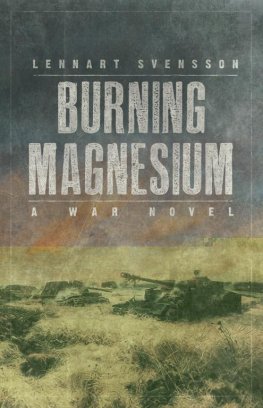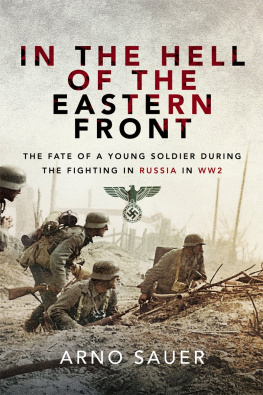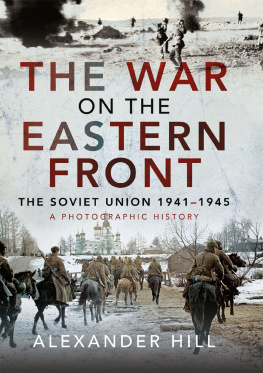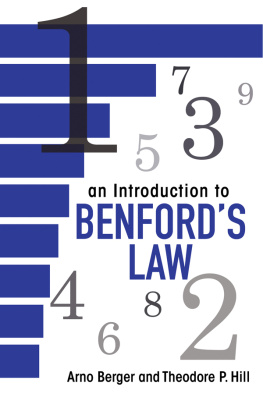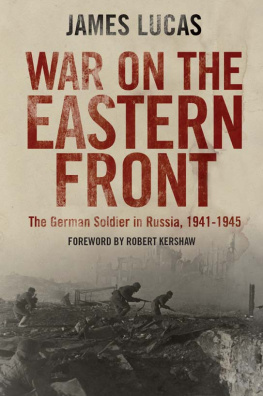Lennart Svensson
BURNING MAGNESIUM
He knew that war was coming. He knew it as early as 1938.
It was a sunny afternoon. Arno Greif was going home from work, accompanied by his younger cousin Gustav. Gustav had just happened to come by. Listening with half an ear to the youngsters rants, Arno steered his steps towards a football field, a shortcut.
They stopped in the middle of the grass field. The weather was warm, the sky was a hazy blue. The sound of the city was a faint murmur in the distance. A football was sitting in one of the goals. Gustav went off to fetch the ball and begged Arno to take some shots with him, Gustav, as goalie.
You asked for it! Arno said, placing the ball some ten metres from the goal as the youngster placed himself in it. Right then, low-flying over the city, a Swedish air force bomber came thundering overhead a Junkers Ju 86, a plane the Swedish Air Force called the B3. It was Swedens first modern bomber, purchased in Germany and introduced into the Swedish Air Force in 1936. Until then the countrys aerial defences mostly involved biplanes. Now came this giant, this archeofuturistic metal bird, one of its breed roaring over Karlstad this day in June 1938. It was a liaison flight between F5 Wing in Skne and F4 Wing in stersund.
Gosh, wow! Gustav said, forgetting all about playing ball. Junkers 86! Some monster, eh, this is the best we have. Heavy bomber. German.
Arno didnt say anything. He was slightly paralysed by the sight. He knew, of course, that his country had an Air Force. And he knew that he himself would soon do military service. Yet this was something of a revelation: to see a military aircraft in the sky, flying so low so that you could almost touch it.
War was coming. He knew it. There were rumours of wars in Europe and now he grasped it at once: there will be war.
A roaring bomber in the sky doing a fly-past, in itself undramatic, but with the casual appearance of a flying dinosaur with its grey, green and brown camouflage, the gaping engine nacelles, the glass windshield, the MG in the nose mounting, the radio antenna and everything it was like a cry from another world a world of steel and bronze, armol and magnesium, gunpowder and lead. A world calling on Arno Greif where he stood on the football field. A different world, a world apart from caf sessions and Stockholm-Motala on the radio, Edvard Persson, Ulla Billquist and Levande Livet.
A fine plane indeed, Arno eventually said. Supreme airpower.
Yeah, Gustav said. The way of the future. No more biplanes.
Would you like to be a pilot? In the Air Force? Arno then asked his cousin.
Sure would.
Flying what, then? Bombers? Fighters?
The boy thought for a while, then said:
I think I would like to fly transport planes. More safe.
But what if enemy fighters attack you and your transport plane? What then?
Then there will be friendly fighters around. I hope.
A warrior cant live on hope. He must be prepared to die.
Now youre scaring me, man,
Arno for his part had often thought about death. As a Bible reader he knew the expression, The Valley of the Shadow of Death. Im approaching this region now; this he realized intuitively and privately. The Junkers 86 in the sky was a sign of this, a symbol, a portent, an image that told him of another world, a different land. It was a sign of the times, out of time: a character from primeval times, from a timeless, archaic domain. It was a message from a country called War, a herald speaking of elemental forces of dancing with the god Shiva, of gunpowder and lead and shell casings in a ditch, of bomb lines and air corridors, searchlights and sirens, marching columns and barbed wire, and all in one and one in all.
The bomber in the sky was a portent of total war. So it was a statement against the prevalent Swedish sentiment of well manage, we wont be dragged into a conflict, we stayed out of the Great War, weve had peace for over a hundred years and this will go on forever, hallelujah
+++
Arno was born in Karlstad in 1919. He was 183 centimeters tall, rather slim with the body of a long-distance runner. He had dark blond, short hair and blue eyes. The gaze of those eyes was fixed and steady; wide open. But at the same time the look in those eyes had a slightly dreamy expression. You could say that they were the eyes of a dreamer of the day.
Arnos father was called Horst. He was a German accountant who had moved to Sweden during the First World War. His firm, Ferrogut AB, which dealt with lathes, had urged this move. The company had an agency in Karlstad, a good investment considering the business it had with Bofors, Nohab, FFVS, Asea and other companies in Central Sweden.
In Sweden Horst had married Tora Bengtsson. And they had their only child Arno in November 1919.
Arno attended elementary school for six years. Then, two years in junior secondary school. He then became an apprentice chef at Karlstad City Hotel because he felt like it. And he managed this job rather well, he was handy, meticulous and energetic. On finishing basic training he was employed as a cook in 1936. The place had three line cooks, a head chef, a woman handling the cold buffet, a butler and four waiters and waitresses. Arno wasnt particularly interested in advancing in the profession. He was satisfied if he could go to work, being told that today he would make hamburgers, shape them, fry them and put them on a plate and then go home and smoke, drink tea and read Nietzsche. He also took up meditation. Meditation mobilises your inner strength was his mantra.
Arno rented a room on the outskirts of the centre of town, in the middle zone. In his spare time, he read about Nietzsches vitalism, he read Jnger, he read Carl Jung. In Jung he appreciated the idea of the Shadow: we all have a psychological counterpart, a less appealing image of ourselves. If you can accept this shadow, realise that you also have some dark aspects; you can become a more fully rounded person, a more variegated, balanced type. One who isnt merely governed by the good-bad, right-wrong duality. Instead, by somewhat integrating these and other opposites, life becomes richer.
Arno even read the Bible. As intimated he liked the image of the Valley of the Shadow of Death. He also liked the line, I Am That I Am. This became his motto. And Christs saying that the kingdom of God is within you was important to him. That was what even the Old Testament writers had intimated, with words like, though I walk through the Valley of the Shadow of Death, I will fear no evil, for you are with me. And, having God within you, you didnt have to go to church and worship him. There was no need to pray to an external God if you felt His presence within. You could meditate on your own Divine Nature, illuminated by the light of your own spirit.
Such was Arnos God-oriented creed. Then, the question might be posed, how could he reconcile this with Nietzsches statement, God is dead? But to Arno God wasnt dead. However, the approach to godhead needed to be redefined, maybe worshipping God in church on Sunday wasnt the optimal way to approach this wonder. So far Arno could accept the critique of old school Christianity. Besides that, Arno acknowledged Nietzsches vital side, his worshipping of the elements, his happy-sad attitude, his tragic optimism.
Arno had also been influenced by the ancient text of the Bhagavad-Gt. He cherished the idea of apateia also known as samatva, facing happiness and unhappiness, success and defeat with equanimity.
Arno acknowledged this apateia, this stoic serenity. He also liked the idea of physical exercise, the concept of shaping your life positively with cross-country running, skiing and football.

